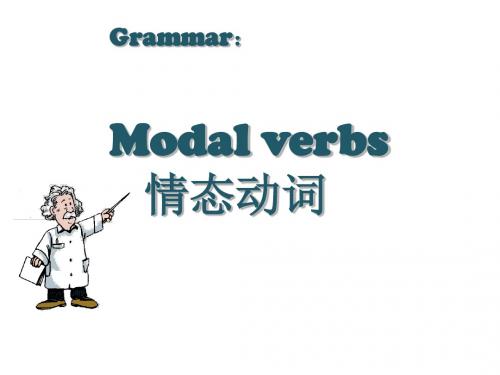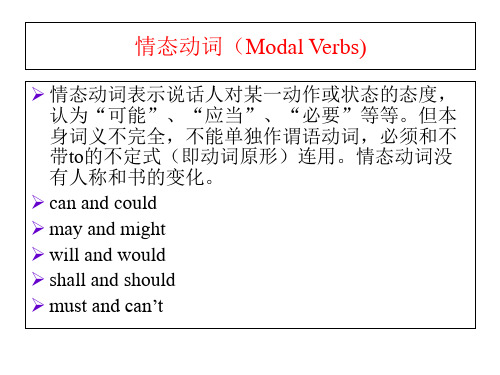学年高中英语学业水平测试课件专题八情态动词(共31.ppt
合集下载
情态动词全部ppt课件

16
Some festivals are held to satisfy the ancestors, who might return either to help or to do harm.
推测
17
--- Excuse me. Is this the right way to the Summer Palace?
3. will/would
1. 表示意愿,will表示现在的意愿, would表示过去的意愿。
I will stick to my plan though all of you are against it.
I told him to give up smoking, but he wouldn’t
3. During the vacation, he would visit me
every four days.
过去的习惯
4. Will / Would you pass me the ball,
please?
请求
习惯,倾向 5. Birds will fly to the south in the winter. 24
You can go with them if you like.
--- Could/Can I have a look at your new design? --- Yes, of course you can.
(注意此处答语不能用could)
8
3)用在肯定句中,表示_客__观__上__有__可_ 能 Anybody can make mistakes. Driving on the snowy roads can be very dangerous.
Some festivals are held to satisfy the ancestors, who might return either to help or to do harm.
推测
17
--- Excuse me. Is this the right way to the Summer Palace?
3. will/would
1. 表示意愿,will表示现在的意愿, would表示过去的意愿。
I will stick to my plan though all of you are against it.
I told him to give up smoking, but he wouldn’t
3. During the vacation, he would visit me
every four days.
过去的习惯
4. Will / Would you pass me the ball,
please?
请求
习惯,倾向 5. Birds will fly to the south in the winter. 24
You can go with them if you like.
--- Could/Can I have a look at your new design? --- Yes, of course you can.
(注意此处答语不能用could)
8
3)用在肯定句中,表示_客__观__上__有__可_ 能 Anybody can make mistakes. Driving on the snowy roads can be very dangerous.
情态动词语法讲解PPT课件

2表示“许可”和“不许”
a)请求对方“许可”可用can, could, may, might.
may/might较正式,could/might较委婉
表示给予“许可”通常用can/may,而不用 could/might
Could I use your phone? Yes, of course you can. Might I trouble you for a light? You may indeed.
表示将来的“必须”,常用have to的一定 形式(will/shall have to) 比较:
•We must do it again.(表示现在)
•We’ll have to do it again.(表示将来)
•表示过去的“必须”,常用had to
•I had to leave at six yesterday.
•They must be home by now.(他们现在一定到家了)
will/would表示“推测”可有三种情况
1)对特定事态的推测
A: Who’s that man over there? B: That will be George, no doubt. C: That would be George, I except.
• Can they have missed the bus?
• Yes, they may have.
may not重音落在助动词上,表示 “不可能”,重音落在否定词上,表 示“不许可” , 比较:
•He may not go tomorrow.
•He may not go tomorrow.
•所以在书面语中,表示“不可能” 常用can’t
《英语情态动词》PPT课件

(12) You can't be too careful while driving. 开车时越小心越好。
【结论6】 cannot ... too/enough表示“无论……也不过 分”;“越……越好”。用来加强语气。 (13) I couldn't but choose to wait.
【结论7】cannot but do sth. 不得不;只好 (14) They were able to put out the fire without any help from the firefighters.
(8) Can it be true? (9) You can't be serious! (10) Oh, dear, what on earth can this mean? (11) How could you do such a silly thing? 你怎么能做那样的蠢事呢? 【结论5】表示惊讶、怀疑、不相信的态度,常用在否 定句、疑问句和感叹句中。
(3)表示“偏执”,“固执” “偏要、硬要” 。 — How old are you, madam? — If you must know, I'm twice my son's age. Don't interrupt me, John. Must you force me to tell you the truth at the moment?
A computer can’t think for itself; it must be told what to do.(一般能力) 句意为:对绝大多数受到威胁时而不能起身逃跑的植物 He is a native speaker of English, so he can of course 来说,最大的问题是动物喜欢吃它们。情态动词can 可 speak English quite well.(一般能力) 表示对能力的否定。 I以表示人的能力和物的性能,故选 am starving to death. I can eat twoB bowls of rice now. (现在的能力) The biggest problem for most plants, which ___just get up and run away when threatened, is that animals like to eat them.(07湖南) A. shan’t B. B can’t C. needn’t D. mustn’t
情态动词精品课件PPT课件

第22页/共52页
• It is usually warm in my hometown in March,but it can be rather cold sometimes.
• 我的家乡在三月份通常很暖和,但有时候也会相当冷。 • Mr.Bush is on time for ever ything.How can it be that he was late for the
meeting? • 布什先生做什么事情都很准时,他怎么可能开会迟到呢? • He can't be in the classroom ,for the light has been turned off. • 他一定不在教室里,因为灯已关了。
第23页/共52页
• 2.may用于肯定句中可以用来表示推测,意为“可能”;用于否定句中也可以表示 推测,may not意为“可能不”,表示一种不太确定的语气。may在疑问句中一般不 表示推测。
You'd better not. 等)不,你不可以用。
第11页/共52页
• 3.must和have to的用法 • must表示“必须、应该”。否定形式must not(mustn't)表示“不应该、不许可、
不准、禁止”等。在回答must的问句时,否定式常用need not(needn't)或don't have to表示“不必”,而不用must not,因为must not表示“禁止”。must表 示“一定、必定”等推测意义时,一般只用在肯定句中。 • The work must be finished as soon as possible. • 这项工作必须尽快完工。
第21页/共52页
• 热点考向二 情态动词表“推测”的用法 • 表示对目前或将来情况的推测往往用“情态动词+动词原形”这种结构。 • 1.can用于肯定句中表示可能性,意为“有时会”;用于疑问句中可以表示推测,意
• It is usually warm in my hometown in March,but it can be rather cold sometimes.
• 我的家乡在三月份通常很暖和,但有时候也会相当冷。 • Mr.Bush is on time for ever ything.How can it be that he was late for the
meeting? • 布什先生做什么事情都很准时,他怎么可能开会迟到呢? • He can't be in the classroom ,for the light has been turned off. • 他一定不在教室里,因为灯已关了。
第23页/共52页
• 2.may用于肯定句中可以用来表示推测,意为“可能”;用于否定句中也可以表示 推测,may not意为“可能不”,表示一种不太确定的语气。may在疑问句中一般不 表示推测。
You'd better not. 等)不,你不可以用。
第11页/共52页
• 3.must和have to的用法 • must表示“必须、应该”。否定形式must not(mustn't)表示“不应该、不许可、
不准、禁止”等。在回答must的问句时,否定式常用need not(needn't)或don't have to表示“不必”,而不用must not,因为must not表示“禁止”。must表 示“一定、必定”等推测意义时,一般只用在肯定句中。 • The work must be finished as soon as possible. • 这项工作必须尽快完工。
第21页/共52页
• 热点考向二 情态动词表“推测”的用法 • 表示对目前或将来情况的推测往往用“情态动词+动词原形”这种结构。 • 1.can用于肯定句中表示可能性,意为“有时会”;用于疑问句中可以表示推测,意
高中英语-情态动词 课件(共34张PPT)艺体班

• Must的奇葩用法 "偏偏,非得要” • You must play the piano at such a late time? • Why must school begin so early?
四、 shall, should
1) shall 用于第一\三人称疑问句,征求对方的意见。(will用于第 二人称疑问句,征求对方的意见。)
need *否定句及疑问句中;
(sb.) need to do
dare
dare to do
3.常以needn’t 的形式出现;
和daren’t(sth.)
need
to
be
4.dare有其过去时dared.
done
(sth.) need doing
• need 的被动含义:need,want, require, worth (adj.)后面接doing 也可表示被动
• (1)表示许可;
• (2)用于祈使句,表示祝愿,翻译为“祝……”
•
May you succeed!
• (3)把握不太大的推测(只能用在肯定句,不用于疑问句)
•
might不是过去式,它所表示的可能性比may小。
•
1.He may /might be very busy now.
• 固定结构: • 1.may well 有充足的的理由可以-• You may well be proud of him. • 2.may/might as well 还是…为好 • There’s nothing to do, so I may/might/ as well go to bed. • 既然没什么事可做,我还是去睡觉为好. • 3.might as well have done 还不如--(还可用于指过去的
情态动词 专题课件(共28张PPT)

➢ 5. (may/can) ____c_a_n_____you swim? 表示能力
➢ 6. Listen, please. You (may not/might not)
____m__a_y__n_o_t______ speak during this exam.
表示不允许
may, might, can, could
may, might, can, could
表示猜测
➢ 1. They (can/might) ____m_i_g_h_t___be away for the
weekend but I’m not sure.
表示许可
➢ 2. You (may/might) ___m__a_y____leave now if you
can and could
➢So he can carry heavy books. ➢ability ➢He couldn't open the door by himself. ➢ability ➢Could you open the door, please? ➢request
can and could
表示猜测(不可能)
➢7. They (can not/may not) ___c_a_n_n_o_t_______ still be out, the light is on in the house.
➢8. You (couldn’t/might not) 表示许可
____c_o_u_ld_n_’_t_______ smoke on the bus.
➢9. With luck, tomorrow (can/could) ___c_o_u_ld____be a cooler day. 表示猜测
高考英语一轮复习 第二部分 基础语法突破 专题八情态动词学业水平测试课件.ppt

表示请求
Will/Would you go with me? 你愿意和我一起去吗?
表示真理“总是”
Oil will float on water. 油总是浮在水面上。
He would get up early when 表示过去的习惯 he lived in the country.
他住乡下时总是早起。
He should arrive soon. 他可能很快就到了。(=will probably)
It's strange that he should be late. 真奇怪,他竟会迟到。
How should I know? 我怎么知道呢?
6
will/ would
表示愿意
He will take you home. 他愿意送你回家。
12
You mustn't play with fire. 你不许玩火。 They don't have to buy cellphones at present. 他们目前没有必要买手机。
13
3.ought to 的否定式是在 ought 后直接加 not,疑问 式是将 ought 提至主语前。
第二部分 基础语法突破
1
专题八 情态动词
2
情态动词本身有一定的词义,但是不能独立作谓语,
只能和行为动词一起构成谓语。
主要用法
典型例句
表能力“能,会”
I can answer the question.我能 回答这个问题。
表请求“能,可以” can/c ould 表允许“能,可以”
Can you help me with it? 能帮我弄这个吗?
11
2.must 与 have to 的区别 表示“必须”时,must 表示主观看法;have to 表示 客观需要。must 的否定式表示“禁止,不许”;have to 的否定式相当于 needn't,意为“不必”。 I must finish my homework first. 我必须先完成作业。 Mother is out,so I have to look after my sister. 妈妈不在家,因此我不得不照看妹妹。
2017-2018学年高中英语学业水平测试课件专题八情态动词(共31张PPT)

4 .— The fire in the supermarket last night was terrible! — They ________ have taken some measures to prevent it occurring. 5.—Can't you stay a little longer? — It's getting late. I really________go now. My daughter is home alone.
1.can 与 be able to 的区别 (1)can 只有一般现在时和一般过去时;而 be able to 则有更多的时态,如将来时、完成时等。 I knew I couldn't afford the rent. 我知道我付不起租金。
I'm sorry I haven't been able to answer your letter in time. 真对不起,我没能及时地给你回信。
6.—I'm afraid I have to leave now, for you see, he is waiting for me. —Well, if you ________, at least wait till the heavy rain stops. 7.My book,The House of Hades, is missing. Who ______ have taken it? 8.I ________have worried before I came to the new school,for my classmates here are very friendly to me.
答案:1.must 4 . should 9.may 10.should
